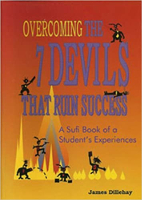
Image by Gerd Altmann
Vanity means pride or self-worship, which is different from self-love. In the effervescence of gaining achievement, it is easy to become enamored with oneself. You are happy having found what you want. It's so wonderful that everyone else must surely see its value, acclaim your efforts, and of course, shower you with money for doing it. Others may not all see it the same way, yet.
This is a point where you can make use of doing what you love to do to become happier and more prosperous. The trick is to not be swept off your feet by vanity, but to look for ways in which your project can be turned into a product or service with a practical application in the world. You may indeed have come up with a fantastic idea. Now is the time to see if anyone else wants or needs it. Any business which offers a product cannot survive out of vanity but must identify and fill their customers need(s).
A Close Example
After leaving my family's business, I went through a series of meaningless, but expedient jobs, hoping that I would some day find a work I could love. I eventually found myself living in a mountainous area of New Mexico, learning to weave. At the same time, I began writing, though I found it frustrating and somehow intangible. By comparison, weaving seemed to satisfy a need to create something beautiful with my hands. Working with colors and rich textures opened my eyes to a new world. When customers bought my pieces, I felt a sense of accomplishment. It was a renewing experience without the claustrophobia, tedium, or politics of working for a big company.
I believed that my business background would help give me a marketing advantage over other weavers. Drawing on past experiences in retail, I began selling my work at shows and through galleries. Vanity made me imagine that my previous successes would protect me and that I would be successful because I once was. Unfortunately, I overlooked the need for homework to learn more about my trade or to keep up with current trends in the marketplace.
After an initial three years of steady growth, my sales suddenly dropped to frighteningly low levels. Unsure of how to improve the situation, I considered writing as an alternate income. Continued resistance from writer's block, however, caused doubts about whether I could succeed. I asked myself, too, if my desire to write was genuine or just vanity. Maybe I was only getting caught up with the idea of becoming an author. I did not question whether I had anything worth writing about.
Meanwhile, my weaving business was rapidly dissolving and I wondered if I would now have to start looking for a regular job. Then one day, I happened to see a copy of a Writer's Digest which featured an article listing the top hundred magazines for beginning authors to write for. It occurred to me that if I knew exactly who I was writing for, perhaps I could complete and sell stories to magazines. Also, I could not help feeling a tingle of vanity at the expectation of being published.
Asking For It
The question became "What will I write about?" Painful experiences especially stood out in my memory, as I felt a returning pang of regret over my failing weaving business, Certainly, I could write about the misfortune of losing a life-style I had come to cherish. I wondered, however, if I, as a reader, would care about someone else's hard luck experiences? Probably not, unless the story provided a way to resolve the problem(s) that plagued me, too.
Thinking about my weaving business, it occurred to me that other fiber artists must go through frustrations similar to mine when trying to sell their work. Where did they turn for help? Despite considerable searching, I found no reference books that answered these problems. Suddenly, I realized I was in an excellent position to help others by relating my own experiences.
At that point, a new enthusiasm took over and I reached for pen and paper. Words flooded out. Not only had writer's block disappeared, but the process was purging the lingering pain of my business failure from my psyche. Vain notions of becoming a published author had transformed into a burning desire to find the most practical answers to what others needed. Searching bookstores and the library, I read all I could find about craft business. By the time I added this new information to what I already knew from experience, I felt like an expert. I could have abandoned the writing project then and easily revitalized my business, but it felt important to first finish what I had begun. The result was a book of marketing solutions for weavers, fiber artists and other craftspeople wanting to be in business.
Learning The Lesson
The book received excellent reviews and went on to sell out of two printings. However, the taste of my initial success left me open to more subtle attacks for vanity. After my book was published, a story in itself, a distributor found it very popular with his customers and began ordering boxes of books at a time. He often congratulated me, saying how well the book was selling. Meanwhile, he was getting later and later with his payments.
At first, I ignored the problem because he gave the book a place on the front of his catalog and displayed it at trade shows. Soon though, he owned me over $1,200 for books I had shipped on credit. When I finally realized that he was flattering me to forestall payments, I had to think of a way to get paid without losing the opportunity he provided for selling more books.
I was usually reluctant to discuss my business undertakings with friends who were not in my business. In my pride, I did not believe that someone without such experiences could grasp the situation. Ironically, it was the impulse to tell a musician friend about the distributor problem, that gave me insight needed to turn the condition around to my favor. When I explained the circumstances, my friend, who had a clearer perspective from not being involved, reminded me that despite the collection problem, I still held the advantage. The distributor needed more books and I was the only source.
Too concerned about getting paid, I had overlooked the obvious answer. I called the distributor the next day and explained that the book would soon be unavailable because so many overdue payments made it impossible for me to afford the cost of another printing. Fearing he might lose a highly profitable item, he offered to finance the next printing as well as pay all the overdue bills.
Watch Your Step
In all of the above incidences, I found vanity nearly ruining my success. I almost missed helpful advice from a friend because I felt I was above it. Distracted by flattery, I put off collecting money that was owed me. If I hadn't turned my vanity of being an author into providing a service to others, I might never have become published.
Feeling good about yourself is healthy. When self-love turns to self-worship, it's easy to get illusions of grandeur. As a productive counter, it is a good practice to look at your creative ideas or projects for ways in which they help others. Any small business owner will tell you that finding and filling a particular need is the key to success.
When what you do or create will positively help others, it can become a practical way to gain satisfaction and affluence. If the intention behind your efforts is to provide real services, the public will reward you.
Checking Your Vanity
Take an activity you enjoy doing and treat it as if it were the subject of a book. Remember that you will be writing this as if others will benefit.
Answering the following questions will create an outline which is really a simplified business plan that will help organize your ideas toward creating income from what you love to do:
- Clearly, what are the activities which I feel good about doing?
- Does it result in a product others will buy?
- Exactly who needs my product or service?
- How many ways are there of reaching buyers?
- What are my priorities: do I want ease of activity or more sales?
- Do I imagine that previous success exempts me from doing the homework needed to make this project work?
The above was reprinted with permission.
Published by Warm Snow Publishers,
P.O. Box 75, Torreon, NM 87061.
Article Source:
 Overcoming the 7 Devils that Ruin Success
Overcoming the 7 Devils that Ruin Success
by James Dillehay
Author, James Dillehay would have one day run his family's successful business. A sufi teacher appeared in his life advising him to leave it. This is his story about how he walked away from security for the unknown, escaped financial ruin, overcame a long-held fear, and discovered an extraordinary inner source of strength, creativity, and transformation.
For more info, or to order this book, click here. Also available in a Kindle edition.
 About the Author
About the Author
James Dillehay is the author of several books including 'Overcoming the 7 Devils That Ruin Success.' His essays and letters on the Sufi experience have appeared in publications by the Sufi Foundation and Gnosis Magazine. He has also written several books on marketing and selling crafts and also a book on epublishing.
To find out more, visit his website at www.jamesdillehay.com.
























